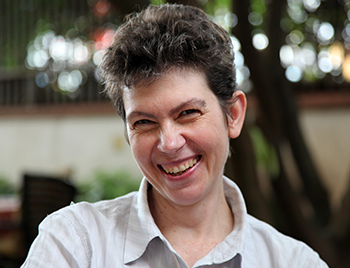Latest News Archive
Please select Category, Year, and then Month to display items
11 June 2021
|
Story Rulanzen Martin
|
Photo Courtesy of artists and the Johannes Stegmann Gallery.
![]()
Liminality is an exhibition of first-, second- and third-year student’s work in the
Department of Fine Arts at the University of the Free State (UFS). The works are from 2019 and 2020. Created during the hard lockdown of 2020, the artworks provide a glimpse of what students had to deal with and overcome during these times.
In a proposal for the exhibition, Angela de Jesus, Curator of the UFS Art Galleries, wrote: “The subtitle of the exhibition is ‘threshold, transition, transformation’ and it refers to the creative processes that students engaged with
in these adverse circumstances resulting in a wide array of artworks in both traditional and adapted mediums.”
The exhibition speaks to our shared experiences of insecurity, fragility, and discord, and to the resourcefulness and immutability of creative expression.
The virtual exhibition runs until 2 July 2021.
The exhibition is also currently available for viewing at the Johannes Stegmann Art Gallery, Sasol Library, UFS Bloemfontein Campus. Monday - Friday 09:00 - 16:00.
 MEGAN JOHNS, Battleground, Tobacco, charcoal dust, plaster of paris and resin, 93.5 x 50 x 7.5 cm
MEGAN JOHNS, Battleground, Tobacco, charcoal dust, plaster of paris and resin, 93.5 x 50 x 7.5 cm
 JACOBETH SELINGA, Linda, Installation: Found bed, wool and thread, 257 x 196 x 91 cm
JACOBETH SELINGA, Linda, Installation: Found bed, wool and thread, 257 x 196 x 91 cm
 POLOKO MOHANOE, Prayer for rain, Gouache on Fabriano, 66 x 72.8 cm
POLOKO MOHANOE, Prayer for rain, Gouache on Fabriano, 66 x 72.8 cm
 SEBOTSE SELAMULELA, In my image (Coronavirus head), Clay, 35 x 40 x 60 cm
SEBOTSE SELAMULELA, In my image (Coronavirus head), Clay, 35 x 40 x 60 cm
 WILLIAM SHAER, Creator, Deconstructed chair, koat wood and Imbura wood, 100 x 75 x 45 cm
WILLIAM SHAER, Creator, Deconstructed chair, koat wood and Imbura wood, 100 x 75 x 45 cm
 Johannes Stegmann Gallery
Johannes Stegmann Gallery
 Interior of the Johannes Stegmann Gallery
Interior of the Johannes Stegmann Gallery
UN-recognised scholar awarded the prestigious TRI Annual PhD Award
2015-11-09

Dr Anneli Botha, winner of TRI Award for Best Doctoral Thesis.
Photo: Supplied
|
Two years after enrolling as a PhD candidate in the University of the Free State’s (UFS) Department of Political Studies and Governance, Dr Anneli Botha was awarded the annual Terrorism Research Initiative (TRI) Award for the 'Best Doctoral Thesis on Terrorism and Counter-Terrorism' (2014).
The TRI PhD award is a prestigious international honour, while terrorism as a scholarly venture remains a concentrated field. Dr Botha, one of the few women in this niche field, has proved to be an excellent asset. Her winning of the prestigious award was announced in its October 2015 issue of Perspectives on Terrorism (PT), a globally-circulated online journal, co-published by the European-based Terrorism Research Initiative and the America-based Center for Terrorism and Security Studies.
Based on the merit and relevance of her outstanding research, the United Nations Development Programme has appointed Dr Botha as a Consultant on Radicalisation. In addition, her PhD is to be published as a book in the United States of America early in 2016. She was appointed as a Research Associate at the University of the Free State at the beginning of this year.
An award-winning search for answers
Her thesis, titled “Radicalisation to Terrorism in Kenya and Uganda: a Political Socialisation Perspective”, tackled East African militancy, from an individualised perspective. Researchers in the past have neglected assessing details of the rebels’ childhoods. Dr Botha’s interviewed about 285 militants and their families. These individuals declared themselves openly as members of al-Shabaab and the Mombasa Republican Council (MRC) in Kenya, and the Allied Democratic Forces (ADF) and the Lord’s Resistance Army (LRA) in Uganda, at the time of the interviews.
Her doctoral dissertation provides significant information about factors that should be considered in the quest to counter and prevent terrorism. Her research shows conclusively that political socialisation begins with the family, and expands through peers, school, media, and earlier political experiences, culminating in the terrorist group.
Outstanding piece of scholarship
Dr Alex Schmid, who is the editor of PT, TRI Award Jury chairman, and one of the most respected experts of terrorism, described Dr Botha’s research as an “outstanding piece of scholarship.”
Dr Botha attributed her success to her supervisors - Professors Theo Neethling and Hussein Solomon - as well as to the people in Kenya and Uganda.